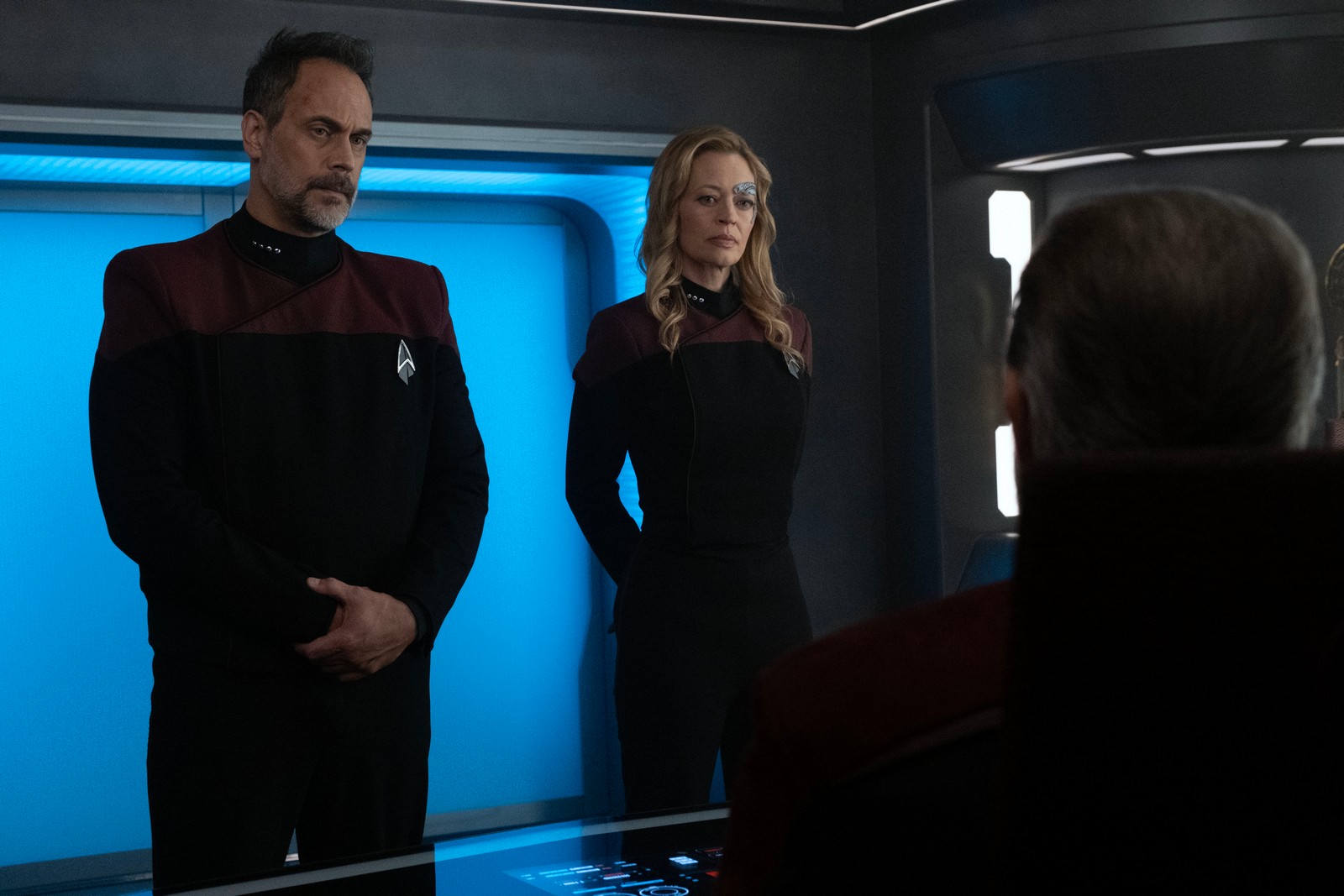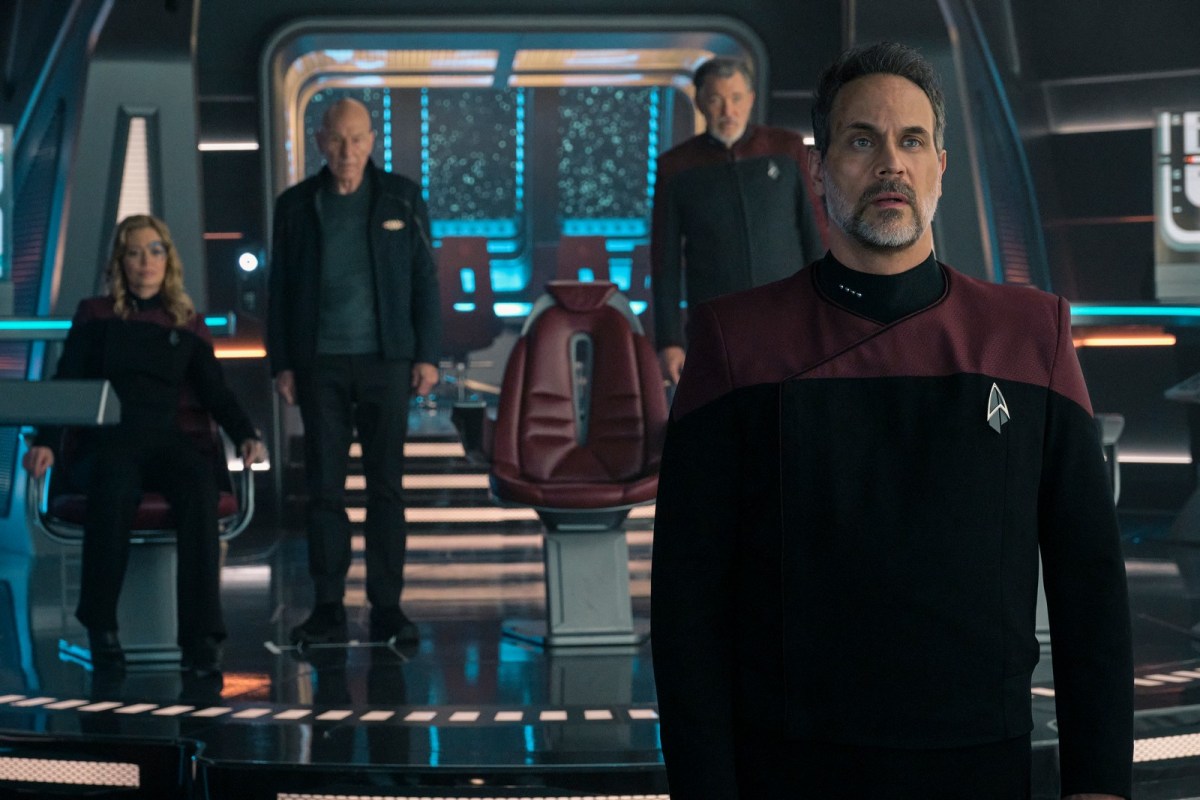This review and discussion contains spoilers for Star Trek: Picard season 3, episode 5, “Imposters.”
The revelation that rogue Changelings had infiltrated Starfleet in “Seventeen Seconds” shifted the third season of Star Trek: Picard into something resembling a conspiracy thriller. To be fair, the season arguably began by hitting that note, with Beverly Crusher (Gates McFadden) imploring her old commanding officer Jean-Luc Picard (Patrick Stewart) to “trust no one,” the iconic catchphrase of the definitive paranoid 1990s television series. This paranoia comes to the fore in “Imposters.”
In the episode’s teaser, Jack Crusher (Ed Speleers) is haunted by nightmares in which he murders the bridge crew of the Titan, suggesting he might be a brainwashed operative like in the classic paranoid thriller The Manchurian Candidate, which got its own loose Next Generation remake in “The Mind’s Eye.” When the Titan intercepts the Intrepid, Commander Ro Laren (Michelle Forbes) arrives on board to reveal the extent and the reach of the Changeling infiltration of Starfleet.
“I believe the Changelings have infiltrated every sphere of power in Starfleet, including key personnel,” Ro warns. “Starfleet is compromised at the highest level.” Captain Liam Shaw (Todd Stashwick) repeats the warning that “Starfleet has been compromised” in his broadcast to his crew. “Jean-Luc, your ship is not the only one with a Changeling problem,” Ro urges Picard. “There have been twelve incidents across multiple starships, all being kept quiet. I’m just connecting the dots.”
As with a lot of the third season of Picard, this plays as a retread of an earlier episode. In the first season of The Next Generation, the episode “Coming of Age” saw Picard receiving a visit from his old friend Admiral Gregory Quinn (Ward Costello), who revealed a sinister plot in the upper echelons of Starfleet Command. In the later episode “Conspiracy,” it was revealed that a parasitic bug-like species had taken over senior officials. This early serialized plot remains an object of fascination for fans and writers.

The “Conspiracy” plot was a product of its time. Writer Tracy Tormé had originally pitched the idea of a conspiracy within Starfleet as a commentary on the then-recent Iran-Contra controversy, in which the American government conspired to sell arms to Iran in violation of an arms embargo. That scandal had also been an influence on the arms-dealing Starfleet Admiral Mark Jameson (Clayton Rohner) in “Too Short a Season.” The threat within Starfleet received an alien dimension in order to appease Gene Roddenberry.
Obviously, these ideas exist in particular contexts and in conversation with particular ideas. A conspiracy thriller in the wake of Watergate or Iran-Contra is saying something different than a similar narrative in the era of “trutherism” or “birtherism.” This is an issue in adapting older works in new contexts. The paranoid conspiracy theories of The X-Files spoke to something particular during the 1990s, but its subtext became much more uncomfortable when the show was revived in the age of Trump.
Star Trek has always been an inherently political show, with the franchise engaging with contemporary issues from the Vietnam War to the counterculture. Sometimes it did so elegantly and sometimes it did so clumsily, but the franchise has always been a science fiction saga that served as a mirror of America’s present, rather than a blueprint for its future. Even Star Trek: Picard itself was very much engaged with the Trump era from the outset: isolationism, xenophobia, refugee crises.
It’s important to stress that the first season of Picard was imperfect in its political commentary. The show was undeniably sympathetic to the Romulan refugees displaced by the supernova that consumed Romulus, earning praise from various human rights organizations. That said, the first season was still a paranoid narrative about how some of those refugees were infiltrators seeking to subvert the Federation, evoking right-wing fearmongering about immigration.

Somehow, the third season of Star Trek: Picard has ditched the empathy that the first two seasons demonstrated towards migrants and refugees, while retaining the paranoid fearmongering about outsiders hiding in plain sight. Indeed, Jack’s two killing spree sequences evoke similar sequences with the synthetics from the show’s first season, creating an interesting thematic bridge between two seasons fixated on the idea of “external enemies within.” It’s an odd choice.
To be fair, it’s unlikely that the third season of Picard is embracing this sort of paranoia deliberately or consciously. Indeed, the third season of the show has worked hard to erase anything even resembling a commentary on the modern world. Instead, it seemed like the show stumbled unthinkingly into this awkward political subtext, creating a story that doesn’t feel like an interrogation of the worst impulses of modern American discourse but an embrace of them.
There is a worrying number of Americans who believe that their government is conspiring against them and that there is a secretive cabal engaged in monstrous activities. These individuals attempted a literal coup of the United States. When Ro warns Picard that he “must make sure that (the crew of the Titan) are loyal,” it’s a choice of language that evokes President Donald Trump’s attempts to solicit the individual loyalty of the officials serving under him.
Individual loyalty is the thematic glue of “Imposters.” It links both of the episode’s plot threads. Ro and Picard navigate the issue of their loyalty to one another, while crime boss Krinn (Kirk Acevedo) ruminates on his relationship to Sneed (Aaron Stanford), “In my world, loyalty is what passes for family.” This feels like the thesis statement of the episode. In Picard, individuals are shrewd enough not to offer loyalty to institutions. However, the third season insists on loyalty to individuals above all else, including ideals.

As an aside, Krinn himself is fascinating. There is something delightfully gonzo and silly in the idea of a Vulcan gangster who has decided “there can be no utopia without crime; ergo, an organized criminal enterprise is logical.” It’s also good to see Kirk Acevedo having fun. At the same time, there’s something uncomfortable about using vertical Vulcan text to evoke teardrop tattoos and a character wearing an IDIC like a medallion. It recalls Voyager’s use of the Kazon as a clumsy commentary on Los Angeles gang culture.
Still, “Imposters” taps into something tied to the Changelings as a concept. The alien species evokes the paranoia of the 1950s witch hunts, the belief that communist sleeper agents had infiltrated America and looked just like everyone else. This may be why Star Trek: Deep Space Nine quickly leaned away from “imposter” narratives using the aliens. The last big infiltrator plotline was “By Inferno’s Light,” two-and-a-half seasons before the show ended and before the Dominion War began.
Indeed, Deep Space Nine was more interested in how paranoia about the Changelings warped the Federation than it was in actual Changelings. In “Homefront” and “Paradise Lost,” paranoia about Changeling infiltration leads to an attempted Starfleet coup. In “Inquisition,” Julian Bashir (Alexander Siddig) discovers how the fear of infiltration has been used to justify the erosion of civil liberties. So it’s weird that Picard is recycling plots that Deep Space Nine outgrew quite early in its run.
Inviting comparisons to Deep Space Nine was always going to be risky for Picard. When Crusher conducts her autopsy of the shapeshifter, she notes, “This Changeling could pass the traditional blood test.” However, Changelings have been passing that blood test since the imposter posing as General Martok (J.G. Hertzler) cut his palm in front of Captain Benjamin Sisko (Avery Brooks) in “The Way of the Warrior.” Joseph Sisko (Brock Peters) ridiculed the efficacy of the test in “Homefront.”

The problem is compounded by the fact that the episode’s central emotional arc, the betrayal that Picard feels toward Ro in the wake of her defection to the Maquis in “Preemptive Strike,” was already played out in the betrayal that Benjamin Sisko felt toward Michael Eddington (Ken Marshall) in the wake of his defection to the Maquis in “For the Cause.” The fact that Forbes and Stewart are both great as Ro and Picard in “Imposters” doesn’t discount the fact that this plot was done better in “Blaze of Glory.”
There is something interesting in the central conflict between Picard and Ro. In many ways, the third season of Picard continues the first season’s fascination with Picard as a failed father figure. Over the course of the season, to varying degrees of success, there is a sense that Picard has damaged relationships with both Jack Crusher and William T. Riker (Jonathan Frakes). Like Riker, Ro is another surrogate child who devoted herself to Picard and whom Picard has perhaps disappointed.
These scenes come close to a legitimate criticism of Picard as a father figure defined by his own ego. “You have no idea what it was like, living under your relentless judgment,” Ro protests. Picard counters, “You betrayed everything I believed in.” Ro objects, “No, you wanted to mold me in your image, your mentorship, your affection. It was conditional.” Given that many of the children in Picard are synthetics who are literally made to their creators’ specifications, this is all very pointed and charged. What does it mean to be a parent?
“I believed in you,” Picard tells Ro. Ro responds, “Only when it was easy for you. If I meant so much, you would have understood.” That feels like what Picard should aspire to be. For all its flaws, the first season did well to establish these surrogate children as series regulars: Raffi (Michelle Hurd), Elnor (Evan Evagora), and Soji (Isa Briones). In the third season, with the emphasis on the returning Next Generation cast, these younger characters seem like props. Picard still doesn’t believe in them.
There is no sense that these conflicts mean anything. Picard’s feud with Riker in “Seventeen Seconds” is forgiven in the opening scenes of “No Win Scenario.” Jack doesn’t spend any time with his father in “Imposters,” despite going through an identity crisis. Ro is killed off at the climax of “Imposters.” What is this recurring thematic motif building towards? What is the third season of Picard saying about this generational conflict? Does the show itself even know? Or is it as confused about its own identity as Jack Crusher?






Published: Mar 16, 2023 10:00 am